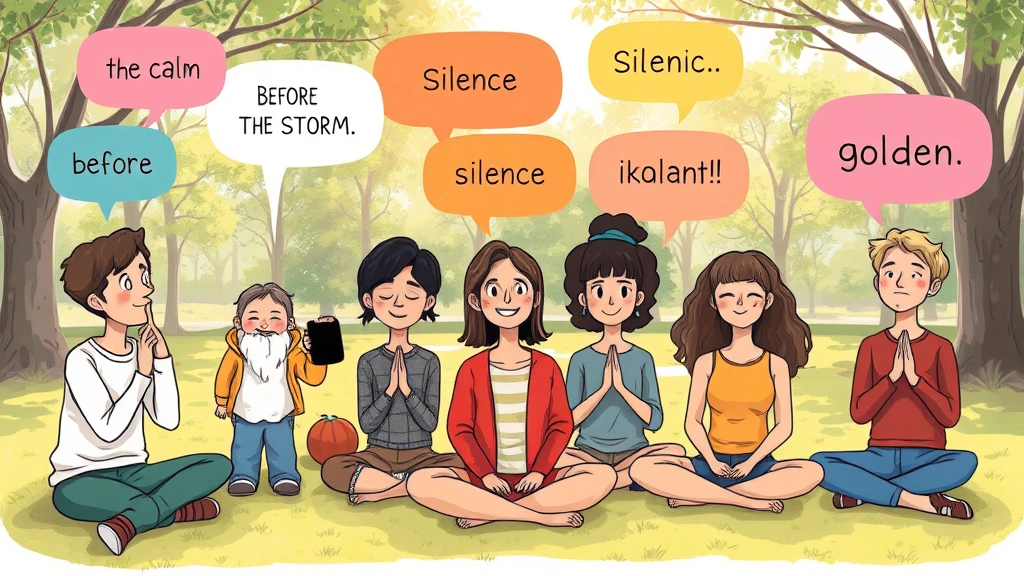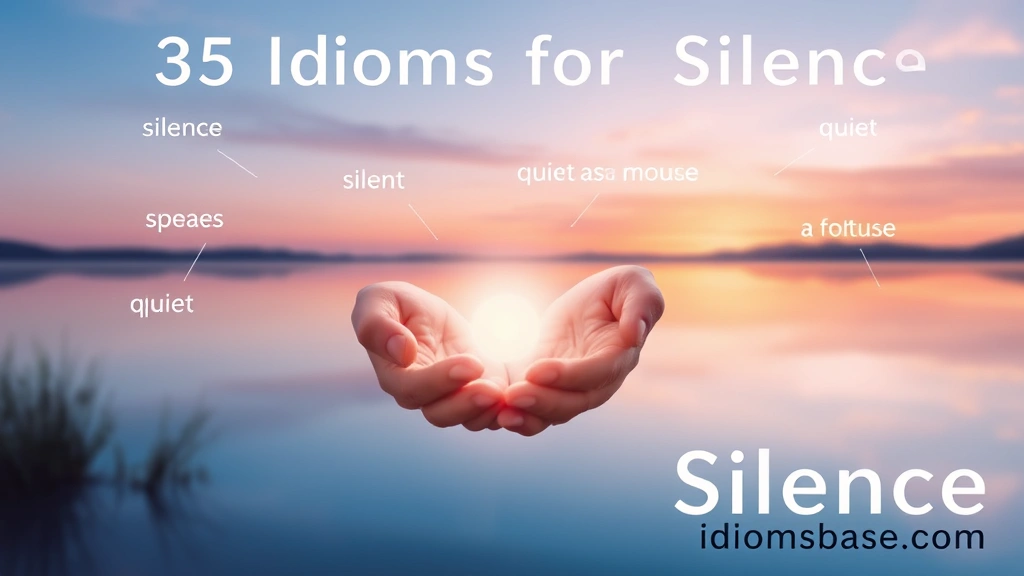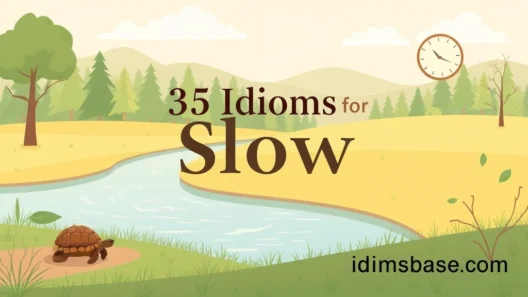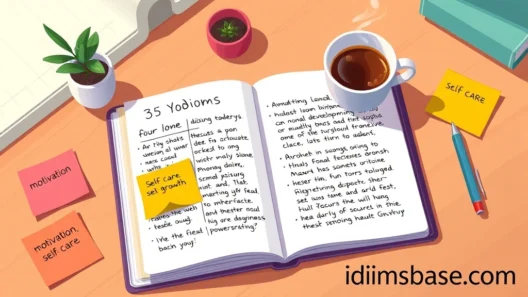Ever found yourself in a situation where words just aren't enough, or perhaps, too much? Silence, in its many forms, speaks volumes. It can be golden, deafening, or even awkward. But how do we talk about not talking? That's where idioms come in! They're those quirky phrases that add flavor to our language, helping us express complex ideas in a snap.
Imagine trying to describe a moment of complete quiet without saying "quiet." Tricky, right? Well, English is packed with fantastic idioms that paint vivid pictures of silence. Whether you're a language enthusiast, a writer looking for new expressions, or just curious, diving into these idioms will truly enrich your vocabulary. Let's explore 35 incredible idioms for silence that will make you a master of unspoken words!
35 Idioms for Silence You Need to Know
Get ready to discover how many ways you can describe the absence of sound or speech. Each idiom has its own unique nuance, perfect for different contexts.
Idioms Describing Complete Absence of Sound
These are for those moments when you could hear a pin drop!
- You could hear a pin drop: This means it's extremely quiet, so much so that even a tiny sound like a pin falling would be audible. Think of a tense moment in a movie or a classroom during an exam.
- Silence reigned: This idiom suggests a pervasive, dominant silence, often implying that quietness took over completely. It's quite formal and dramatic.
- Dead silence: This refers to an absolute and profound silence, often implying a lack of life or activity. It can feel eerie or solemn.
- Pin-drop silence: Similar to "you could hear a pin drop," this emphasizes an almost unnatural level of quietness.
- Not a sound/peep: This highlights the complete absence of any noise whatsoever. "Not a peep" often implies that someone who usually makes noise is unusually quiet.
- The silence was deafening: A paradox! This idiom means the silence was so intense and noticeable that it felt overwhelming, almost like a loud noise. It often conveys tension or awkwardness.
- Hushed silence: This suggests a deliberate quietness, often out of respect, awe, or anticipation. People are actively trying to be quiet.
Idioms Describing Keeping Quiet or Secretive
Sometimes silence isn't just about sound, but about holding your tongue.
- Bite your tongue: This means to stop yourself from saying something, often because it's inappropriate, rude, or would cause trouble. It's a conscious effort to remain silent.
- Hold your tongue: Very similar to "bite your tongue," this means to refrain from speaking, usually to avoid an argument or revealing something.
- Keep mum: To remain silent, especially about something that should be kept secret. It's a more informal way of saying "keep quiet."
- Keep schtum: Another informal idiom, primarily used in British English, meaning to stay quiet or keep a secret.
- Zip your lips: An informal and often playful way to tell someone to stop talking or to keep a secret. Imagine zipping up a zipper over your mouth!
- Button your lip: Similar to "zip your lips," this means to stop talking. It implies closing your mouth tightly.
- Mum's the word: This phrase is used when you want someone to keep something a secret. It's an instruction to remain silent about a particular matter.
- Silence is golden: This classic idiom suggests that sometimes it's better to say nothing than to speak. It implies wisdom in quietness.
- Say nothing: The most straightforward way to express not speaking, but it's an idiom because it often implies a deliberate choice not to comment.
- Keep it under your hat: To keep something a secret; to not reveal information. Your "hat" symbolizes something hidden away.
- Swallow your words: To regret something you've said or to take back a statement, often by remaining silent when you might otherwise speak.
- Hold your peace: To remain silent, often in a formal setting, especially when given an opportunity to object or speak (e.g., "speak now or forever hold your peace").

Idioms Describing Unresponsive Silence
When someone isn't saying anything, and it's noticeable.
- Give someone the silent treatment: To intentionally ignore someone and refuse to speak to them as a way of showing anger or displeasure.
- The silent treatment: The act of giving someone the silent treatment.
- Silence speaks volumes: This means that not speaking can convey a lot of meaning or emotion, perhaps even more than words could.
- Crickets: An informal idiom meaning there's a complete lack of response or activity, as if the only sound is crickets chirping. Often used humorously.
- Stone-cold silence: A very harsh and unyielding silence, often implying a complete lack of warmth or emotion from someone.
- As quiet as a mouse: Extremely quiet and unobtrusive, often used to describe a person who is trying not to be noticed.
- Not a whisper: Similar to "not a sound," emphasizing the complete absence of even the slightest noise or rumor.
- Radio silence: Originally from communication, this means a complete cessation of communication. It implies no messages are being sent or received.
Idioms Describing Forced or Imposed Silence
When silence is not a choice.
- Be struck dumb: To be so shocked or surprised that you are unable to speak. The silence is involuntary.
- Rendered speechless: Similar to being struck dumb; to be made unable to speak due to shock, awe, or emotion.
- Put a lid on it: To stop talking or to bring something to an end, effectively silencing it. Often used when someone is talking too much.
- Silence a critic: To make a critic stop complaining or expressing negative opinions, often by proving them wrong.
- Hush-hush: Something that is kept secret and not discussed openly. It implies a deliberate quietness around a topic.
- Keep under wraps: To keep something secret or not reveal it until a later time. It's about maintaining silence around information.
- Seal your lips: A more formal or dramatic way of saying "zip your lips," implying a solemn promise to keep quiet.
- The calm before the storm: This describes a period of unusual quiet or inactivity that precedes a period of great trouble or excitement. The silence is temporary and ominous.
Key Takeaways
Understanding these idioms for silence isn't just about expanding your vocabulary; it's about grasping the nuances of human communication and emotion.

- Silence is diverse: It's not just the absence of sound; it can convey tension, secrecy, respect, or even anger.
- Context is king: The meaning of an idiom often depends on the situation it's used in.
- Express yourself vividly: Using idioms makes your language more colorful, expressive, and engaging.
- Cultural insights: Idioms offer a peek into the cultural ways people describe universal experiences.
So, next time you're faced with a moment of quiet, you'll have a whole new toolkit of phrases to describe it!
Frequently Asked Questions (FAQs)
What is an idiom?
An idiom is a phrase or expression whose meaning cannot be understood from the ordinary meanings of its individual words. For example, "kick the bucket" doesn't mean literally kicking a bucket; it means to die. They are a fundamental part of natural language.
Why are idioms important in English?
Idioms are crucial because they add richness, color, and nuance to the language. They allow speakers to convey complex ideas concisely and often humorously. Understanding idioms is key to comprehending native speakers and sounding more natural yourself. They also reflect cultural perspectives and history.
Can I use these idioms in formal writing?

It depends on the idiom and the context. Some, like "silence reigned" or "silence is golden," can be used in more formal settings. Others, like "zip your lips" or "crickets," are quite informal and best suited for casual conversation or creative writing. Always consider your audience and purpose.
How can I learn and remember these idioms?
The best way to learn idioms is to see them in context.
- Read widely: Pay attention to how idioms are used in books, articles, and online content.
- Listen actively: Notice idioms in movies, TV shows, and conversations.
- Practice using them: Try to incorporate one or two new idioms into your daily conversations or writing.
- Create flashcards: Write the idiom on one side and its meaning and an example sentence on the other.
- Tell stories: Connect idioms to personal experiences or create short narratives around them. This makes them more memorable.
Are there idioms for silence in other languages?
Absolutely! Every language has its own unique set of idioms, including those for silence. For instance, in Bangla, আপনি বলতে পারেন, "চুপ করে বসা" (chup kore bosha – to sit silently) বা "মুখে কুলুপ আঁটা" (mukhe kulup anṭā – to seal one's mouth, meaning to keep silent). Exploring idioms across languages is a fascinating way to understand cultural differences and similarities in expression.
What's the difference between "dead silence" and "pin-drop silence"?
While both imply extreme quiet, "dead silence" often has a more ominous or eerie connotation, suggesting a lack of life or activity, or a solemn atmosphere. "Pin-drop silence" simply emphasizes the extreme quietness, often in a neutral or anticipatory context, like during a speech or before an announcement.
When would I use "the silence was deafening"?
You'd use "the silence was deafening" when the lack of sound is overwhelmingly noticeable and perhaps uncomfortable. It's often used to describe tension, awkwardness, or a powerful emotional moment where words are absent but feelings are intense. For example, "After the accusation, the silence in the room was deafening."
We hope this deep dive into the world of silence idioms has been enlightening! Which idiom is your favorite, or which one will you try to use first? Share your thoughts in the comments below! Let's keep the conversation going, even about not talking!






